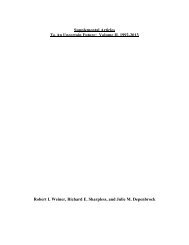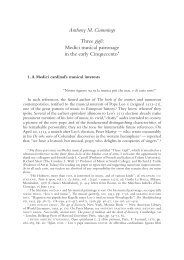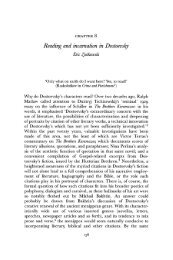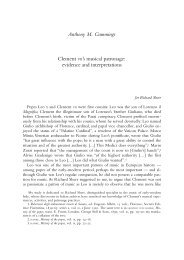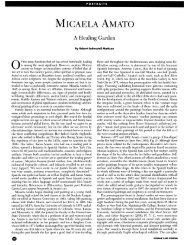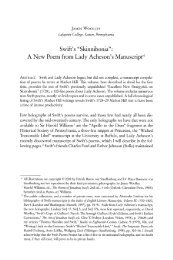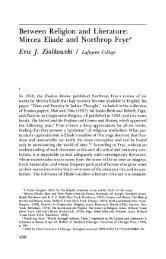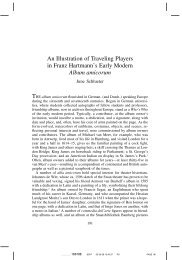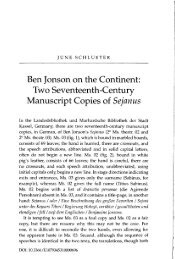courses of instruction - Lafayette College
courses of instruction - Lafayette College
courses of instruction - Lafayette College
Create successful ePaper yourself
Turn your PDF publications into a flip-book with our unique Google optimized e-Paper software.
HISTORY<br />
13 <strong>courses</strong> for the German track includ<br />
ing Government and Law 102,103, 401-<br />
409 (one senior seminar) or 495, 496 (the<br />
sis) or 390, 391 (independent study), four<br />
electives from the following: 221,232,234,<br />
235, 236,237, 238,249, 341; German 111,<br />
112, 211, three electives from the follow<br />
ing: 225, 311, 322, 424, 441,495,496.<br />
13 <strong>courses</strong> for the Spanish track includ<br />
ing Government and Law 102,103,401-<br />
409 (one senior seminar) or 495,496 (the<br />
sis) or 390,391 (independent study), four<br />
electives from the following: 221, 222,227,<br />
232,234, 235, 236, 249; Spanish 111, 112,<br />
211, four electives from the following: 225,<br />
311, 313, 314, 318, 427, 428,495,496.<br />
HISTORY<br />
Pr<strong>of</strong>essor Offner, Head; Pr<strong>of</strong>essors Fix,<br />
D. Miller, Sharpless, Weiner; Associate<br />
Pr<strong>of</strong>essors Jackson, Marbkstone, Rosen;<br />
Assistant Pr<strong>of</strong>essor Barclay, Sanborn<br />
History gives students the opportunity to<br />
deepen their understanding <strong>of</strong> the world<br />
through the study <strong>of</strong> events, inventions,<br />
economic and social processes, and the<br />
ideas that have shaped it. They expand<br />
their mental horizons by studying cultures<br />
different from their own, and they acquire a<br />
set <strong>of</strong> skills highly valued by pr<strong>of</strong>essional<br />
schools and employers in today's job market.<br />
The curriculum begins with the develop<br />
ment <strong>of</strong> historical thinking and research and<br />
surveys American and European history,<br />
then moves to <strong>courses</strong> that analyze specific<br />
epochs in European, Asian, Latin American,<br />
and United States history. The advanced level<br />
<strong>of</strong> topical seminars involves in-depth study<br />
and original research.<br />
Requirements for the Major. The history<br />
major consists <strong>of</strong> nine <strong>courses</strong> that must<br />
include History 106 and two 300-level<br />
seminars (or one seminar plus an honors<br />
thesis). In addition, one <strong>of</strong> nine <strong>courses</strong><br />
counting toward the major must cover a<br />
topic distinct from either United States or<br />
Western European history (i.e., it must fo<br />
cus on "non-Western" history).<br />
As part <strong>of</strong> the history major, students<br />
must choose a focus cluster that provides<br />
132<br />
them with in-depth knowledge <strong>of</strong> some<br />
aspect <strong>of</strong> world history. Each cluster must<br />
include a total <strong>of</strong> five <strong>courses</strong> at the 200-<br />
level and 300-level. These five <strong>courses</strong><br />
may all be within the history department<br />
or they may include one related 200-level<br />
or 300-level course in another department.<br />
But if a student adopts a cluster that in<br />
cludes a related course from another de<br />
partment, he/she still needs nine history<br />
<strong>courses</strong> in order to fulfill the major. Most<br />
students will take both 300-level seminars<br />
(or one seminar and an honors thesis) in<br />
their cluster, although in some cases a stu<br />
dent may take one <strong>of</strong> the seminars outside<br />
<strong>of</strong> the cluster area.<br />
Sample focus clusters include: Pluralism<br />
in American Society; Twentieth-Century<br />
Europe; Modernization, Nationalism, and<br />
Revolution; Intellectual History; Pre-Mod-<br />
ern Societies; Russian History; Building<br />
America; United States Foreign Policy;<br />
Modern America. Consult the History<br />
Department for the <strong>courses</strong> that make up<br />
these clusters.<br />
Requirements for the minor: A minor in<br />
history consists <strong>of</strong> five <strong>courses</strong>, chosen to<br />
focus on one <strong>of</strong> three areas <strong>of</strong> concentra<br />
tion: United States History, European<br />
History, or Third World History.<br />
INTRODUCTORY COURSES<br />
105. Development <strong>of</strong> the Modern World.<br />
This course surveys the development <strong>of</strong><br />
the modern world from the Renaissance to<br />
the present. It stresses the cultivation <strong>of</strong><br />
"historical thinking" by examining themes<br />
and events such as the scientific and in<br />
dustrial revolutions; the formation <strong>of</strong><br />
modern nations, economies and ideolo<br />
gies; Western and global hegemony; and<br />
the crises <strong>of</strong> the twentieth century. Lec<br />
ture/discussion/films. Offered in fall se<br />
mester. Staff<br />
106. Introduction to History. This semi<br />
nar introduces students to the ways in<br />
which historians work and interpret his<br />
torical events. Students learn how to read<br />
critically, to analyze information, and to



